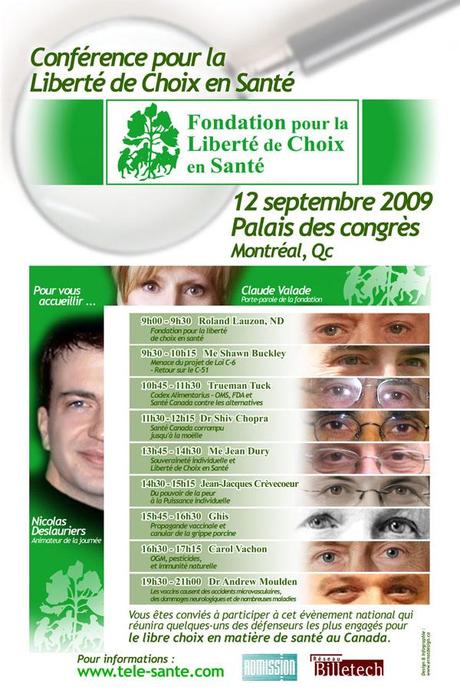Question santé que devons nous faire?
Au Canada cela commence à bouger, à tel point qu’une conférence sur la Liberté de choix en Santé est prévu très prochainement.

La webtélé qui présente les informations censurées par nos gouvernements, les autorités médicales et les médias conventionnels.


cliquez l’image voir le “mot à mot” de QL
Du côté des Etats-Unis on se tâte d’accepter le modèle de santé à la française, une sorte d’Obamania care se met en place, fort heureusement notre cher essayiste français, libéral de surcroît Guy Sorman a pu laisser, glisser quelques vérités a des journalistes du journal IBD, lire la vo ci-dessous:

Vive Le French Care?
By INVESTOR’S BUSINESS DAILY | Posted Wednesday, August 26, 2009
Health Systems: Health care in France is often held up as a model the U.S. might follow. Yet the French have their own problems that show there’s no such thing as a free lunch — or a free doctor’s visit.
Call it the grass-is-greener syndrome. Advocates of national health care, acknowledging the flaws in ObamaCare yet despising the current U.S. system that has the best medicines, the best medical equipment and the shortest waiting lists, have turned their eyes lovingly to places like France.
As City Journal contributing editor Guy Sorman notes, the French would also love to have the low-cost, high-service system some Americans gush about. Unfortunately, they don’t. France’s system isn’t that cheap and is financed by high taxes on labor that have heavy economic consequences.
Sorman notes that a Frenchman making a monthly salary of 3,000 euros has 350 of them deducted for health insurance. Then the employer throws in an additional 1,200 euros. This raises the cost of labor to prohibitive levels and puts a brake on economic growth. This helps explain why French unemployment hovers around 10%.
France imposes an additional tax levy to cover the constant deficits that national health insurance runs.
The French Parliament raises this levy, which applies to all forms of income, every year. Altogether, Sorman writes, “25% of French national income goes toward what’s called Social Security, which includes health care and basic retirement pensions for all.”
Drugs developed in America at enormous expense do cost less in France, which decides what drugs are to be used and at what prices. American patients in effect subsidize the French, who take the same pills at half the price because American pharmaceutical companies don’t want to lose the French market.
French taxpayers fund a state health insurer, Assurance Maladie. Assurance Maladie has run in the red since 1989, and this year’s shortfall is expected to be 9.4 billion euros ($13.5 billion) and 15 billion euros in 2010, about 10% of its budget.
Regardless of the cost, does the French system produce better outcomes? Not always. Infant mortality rates are often cited as a reason socialized medicine and single-payer systems are better than what we have here. But according to Dr. Linda Halderman, a policy adviser in the California State Senate, these comparisons are bogus.
Official World Health Organization statistics show the U.S. lagging behind France in infant mortality rates — 6.7 per 1,000 live births vs. 3.8 for France. Halderman notes that in the U.S., any infant born that shows any sign of life for any length of time is considered a live birth. In France — in fact, in most of the European Union — any baby born before 26 weeks’ gestation is not considered alive and therefore doesn’t “count” in reported infant mortality rates.
France reimburses its doctors at a far lower rate than U.S. physicians would accept.
As David Gratzer, a physician and senior fellow at the Manhattan Institute, wrote in the summer 2007 issue of City Journal: “In France, the supply of doctors is so limited that during an August 2003 heat wave — when many doctors were on vacation and hospitals were stretched beyond capacity — 15,000 elderly citizens died.”
After the tragedy, the French parliament released a harshly worded report blaming the deaths on a complex health system, widespread failure among agencies and health services to coordinate efforts, and chronically insufficient care for the elderly.
It’s hard to imagine that happening here, where hospitals have enough air-conditioned beds and doctors that aren’t on vacation.
Fact is, most Americans like their health care. There are ways to provide expanded coverage at lower cost, such as pushing individually owned health savings accounts, malpractice reform and allowing insurance to be bought across state lines.
We needn’t be forced to sacrifice quality for cost. Nor do we need to look to the French for a better solution. They don’t have one.



